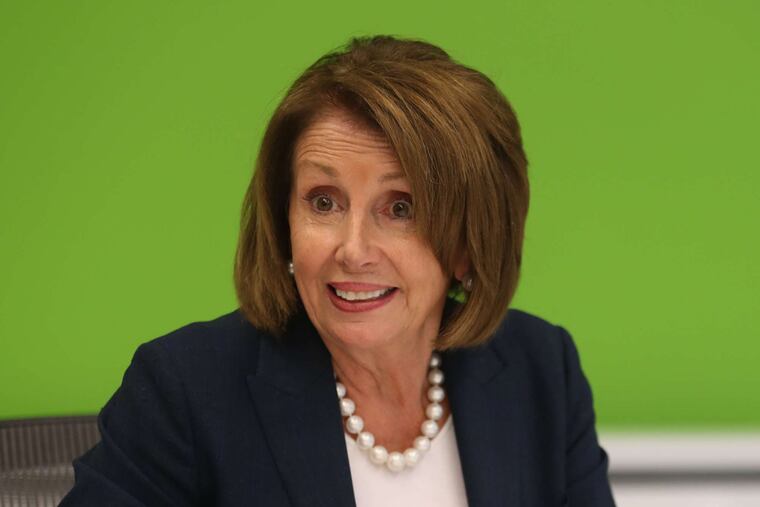Pelosi's challenge in the House
No one could have been more disappointed than Hillary Clinton to see the presidency zigzag past her grasping hands, but Nancy Pelosi probably came close. Not only did the Republicans dash her dreams of becoming House speaker again, but she now faces a serious challenge to remain that chamber's minority leader.

No one could have been more disappointed than Hillary Clinton to see the presidency zigzag past her grasping hands, but Nancy Pelosi probably came close. Not only did the Republicans dash her dreams of becoming House speaker again, but she now faces a serious challenge to remain that chamber's minority leader.
The California congresswoman could hardly control her excitement in a preelection visit with the Inquirer Editorial Board, when polls showed Clinton safely ahead in Pennsylvania and favored elsewhere. Pelosi boldly predicted Clinton's coattails would give Democrats the majority in the Senate and maybe, just maybe, in the House as well.
Pelosi said the Republican Party was "a wholly owned subsidiary of the fossil-fuel industry and in the total pocket of the gun industry." She said the right-wing House Freedom Caucus is only 40 Republicans. "But they have another 140 who are scared to death of the 40. . . . The best antidote to the poison they put out there is to have a big victory for Hillary Clinton."
Of course, that didn't happen. Democrats who had predicted a Republican collapse after an expected Donald Trump loss are instead questioning the future of their own party. Interim party chairwoman Donna Brazile is being shown the door amid heavy criticism of her role in Clinton's loss. Pelosi, who expected to breeze back into her leadership post, faces a challenger.
Rep. Tim Ryan (D., Ohio) announced Thursday that he wants to replace Pelosi. "After this election I believe we all need to reevaluate our roles within the caucus, the Democratic Party, and our country," he said. "I personally don't believe that we can win the House back with the current leadership. . . . I hate to say it, I love Nancy Pelosi, but I just don't think we can do it."
The leadership election was originally scheduled for Tuesday, but after many Democrats complained that more time was needed for them to discuss options, Pelosi postponed the vote until Nov. 30. If she loses, it will end a 13-year reign as her party's leader in the House, including the four from 2007-11 when she served as speaker. She was last challenged in 2010, when she beat Rep. Heath Shuler (D., N.C.) by a wide, 150-43 margin.
It may not be any different this time. In announcing her candidacy for reelection Wednesday, Pelosi said more than two-thirds of the caucus was supporting her. But that didn't scare Ryan, who can make a powerful case that Pelosi represents the party's past, not its future. Ryan said Democrats need a message that resonates in "flyover states" like Ohio, Michigan, and Wisconsin, which Clinton lost.
Rep. Brendan Boyle (D., Pa.) told reporters it would be unfair to blame Pelosi or other party leaders for Clinton's defeat. But he admitted that seeing a Republican presidential candidate win Pennsylvania for the first time since 1988 required some serious soul-searching. "It's a much bigger issue than just who the specific leaders may be at a certain period of time," he said.
Senate Democrats didn't undergo the same drama. Fiercely partisan Minority Leader Harry Reid of Nevada announced last year that he was retiring, and Chuck Schumer of New York won that post Wednesday. Meanwhile, Republicans, bolstered by Trump's unexpected victory, voted last week to retain Mitch McConnell of Kentucky as their Senate leader and keep Speaker Paul Ryan of Wisconsin on a short leash in the House.
What happens to Pelosi may have nothing to do with her leadership skills and everything to do with the message Democrats want to send to America after Clinton's defeat. I asked Pelosi if her divisive reputation has helped keep Congress mired in a partisan swamp. Her answer was an explanation.
"When I became speaker we went after everybody: Wall Street reform, after '08. We went after the insurance industry for health-care reform. We went after Big Oil for climate change. You name it," she said. "We amassed powerful enemies . . . and they decided I was their target because I was effective, and they had to take me down."
Will Trump's victory do what House Republicans couldn't: Bring Pelosi down? I'm not so sure. The symbolism in ending her leadership might be outweighed by another factor. Pelosi points out that while former House Speaker John Boehner and his successor, Paul Ryan, couldn't keep conservatives like the Freedom Caucus in line, she has kept Democrats unified.
"I came to Congress not to be a Democrat, but to be a member of Congress and to stay proud of what I believed in; confident in what I knew, but humble enough to know there is give and take, and you listen and you learn, and some things are much better because they're more sustainable for the whole country if you can reach common ground," Pelosi said.
I liked what she said. We'll see before the month is out whether her fellow Democrats still like her.
Harold Jackson is editorial page editor for the Inquirer. hjackson@phillynews.com